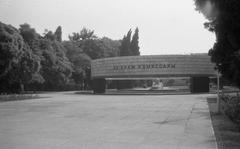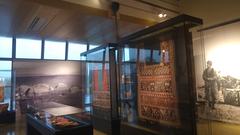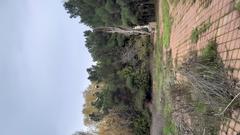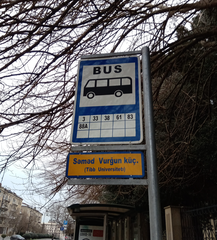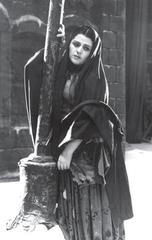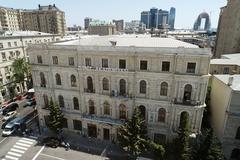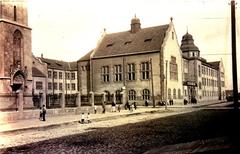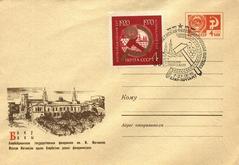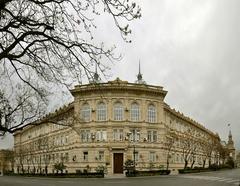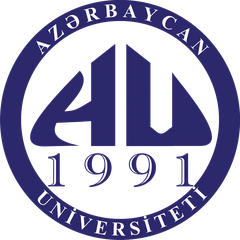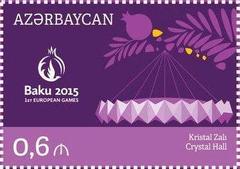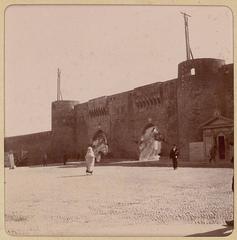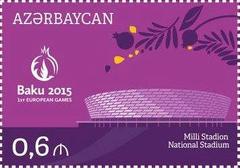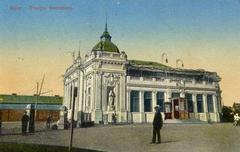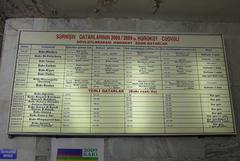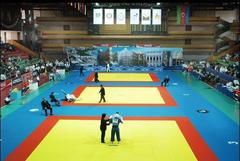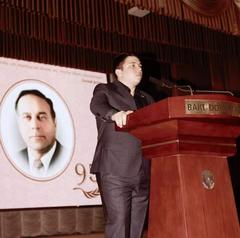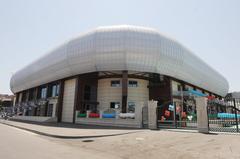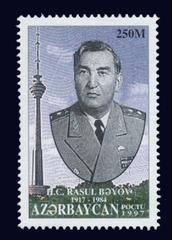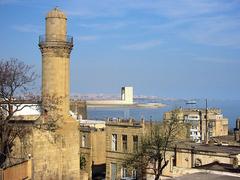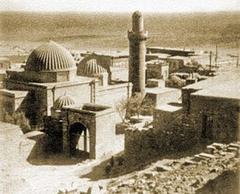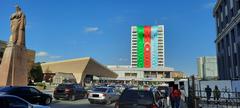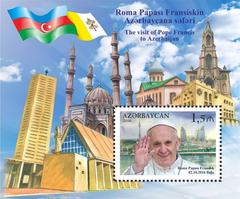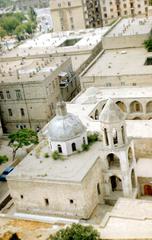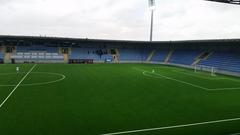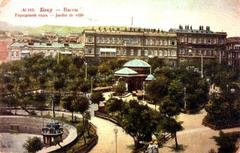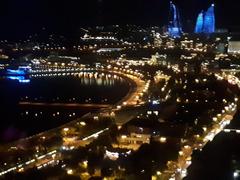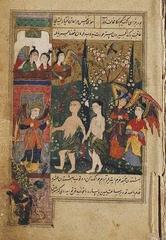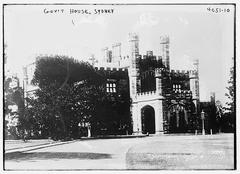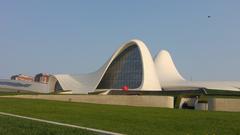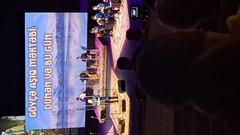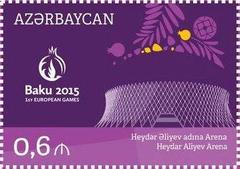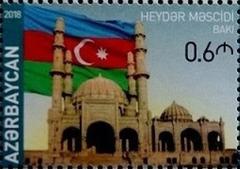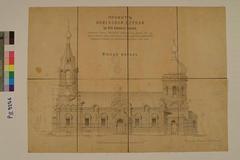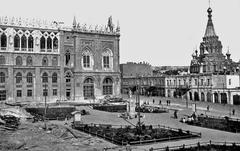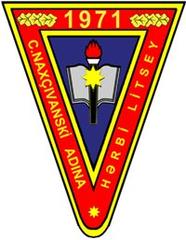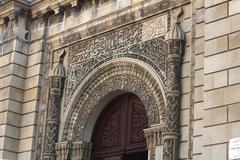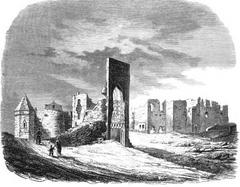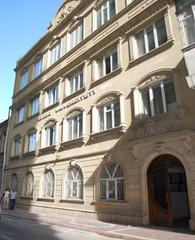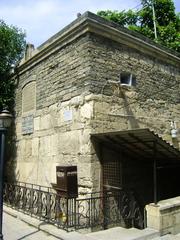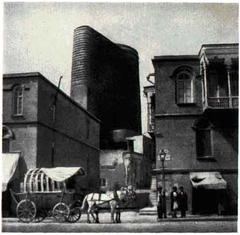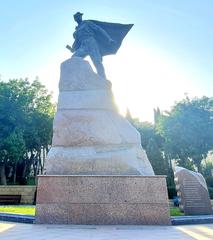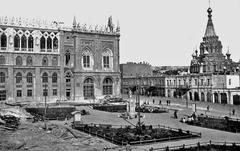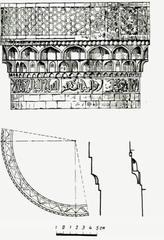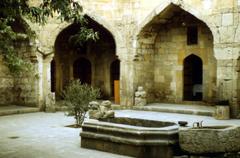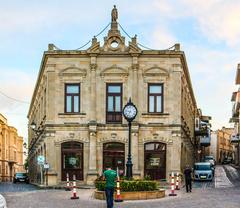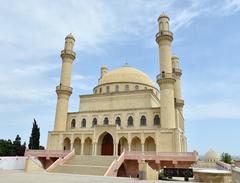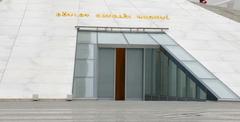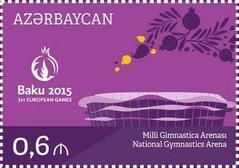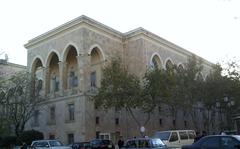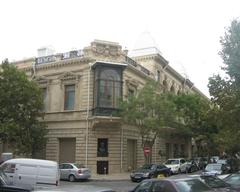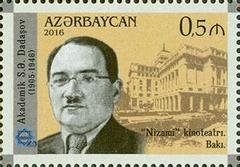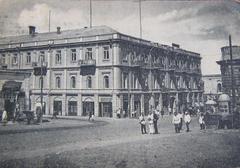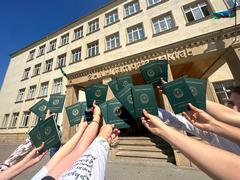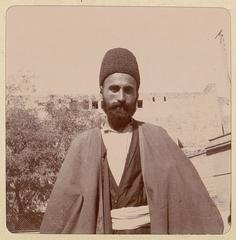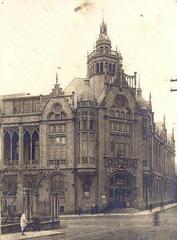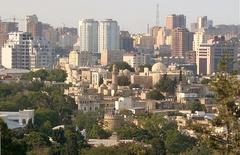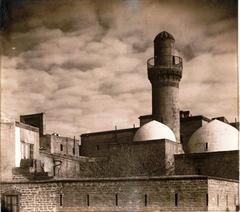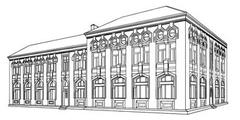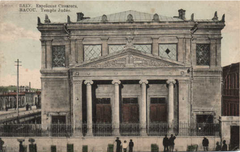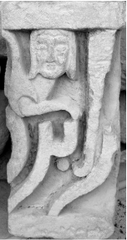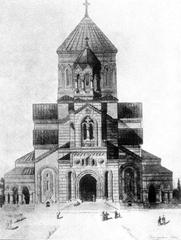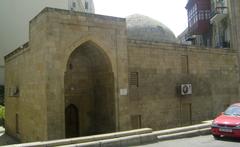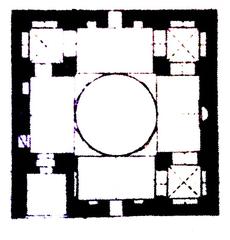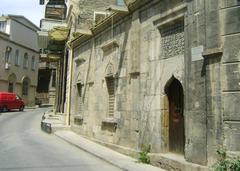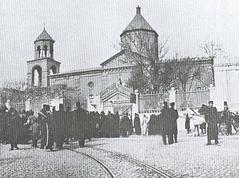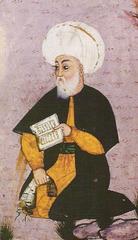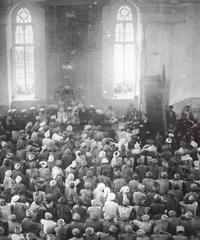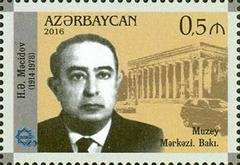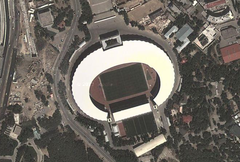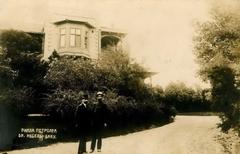Khanlar Mosque Visiting Hours, Tickets, and Guide to Baku Historical Sites
Date: 14/06/2025
Introduction to Khanlar Mosque and Its Historical Significance
Located in the heart of Baku’s UNESCO-listed Old City (Icherisheher), Khanlar Mosque is a remarkable symbol of Azerbaijan’s religious, cultural, and architectural legacy. Built in the late 19th century by the Khanlarov brothers and designed by the renowned architect Mashadi Mirza Gafar Izmaylov, the mosque showcases a harmonious blend of Persian, Ottoman, and local Caucasian influences, reflecting the cosmopolitan spirit of Baku during the oil boom era (bakucity.preslib.az, multikulturalizm.gov.az).
Khanlar Mosque has served as more than just a place of worship; it played a significant role in the spiritual and social life of its mahalla (neighborhood), especially at a time when Baku was rapidly transforming into a bustling metropolis. Over the years, the mosque has witnessed dramatic changes—surviving Soviet secularization, periods of repurposing, and, more recently, preservation efforts that underscore its enduring significance (bbc.com, nomadasaurus.com, Wikipedia).
Today, while the mosque’s interior is not accessible to the public due to its current residential function, its preserved exterior and the vibrant Old City surroundings make it an integral stop for those interested in Baku’s layered historical and cultural narrative (travelmelodies.com, trek.zone, letsgoBaku.com).
This comprehensive guide provides detailed insights into the mosque’s history, architectural features, practical visitor logistics, and its continuing role in Baku’s cultural tapestry. Whether you seek architectural inspiration, historical understanding, or a deeper connection with Azerbaijani heritage, Khanlar Mosque offers a unique perspective within the capital city (azerbaijanimmigration.com).
Contents Overview
- Introduction
- Architectural Origins and Historical Context
- Religious and Social Significance in Pre-Soviet Baku
- Transformation During the Soviet Era
- Early Soviet Policies and Secularization
- Cultural Memory and Preservation
- Post-Soviet Revival and Preservation
- Practical Visitor Information
- Historical and Cultural Context of Khanlar Mosque in Azerbaijani Society
- The Role of Mosques in Azerbaijani Culture
- Architectural and Artistic Significance
- Religious Practices and Community Life
- Symbol of Tolerance and Multiculturalism
- The Mosque’s Role in Local Society
- Preservation and Restoration Efforts
- Integration with Modern Urban Life
- Festivals, Rituals, and Social Functions
- The Mosque as a Heritage Site
- Architectural Features and Visitor Guide
- Historical Context and Design Influences
- Structural Elements and Materials
- Ornamentation and Artistic Details
- Comparative Analysis with Other Baku Mosques
- Integration with Urban Context
- Preservation and Restoration
- Visitor Information: Visiting Hours, Tickets, and Accessibility
- Cultural Significance, Events, and Tours
- Khanlar Mosque Baku: Visiting Hours, Tickets, and Historical Guide
- Current Status and Historical Significance
- Accessibility and Visiting Information
- Visitor Experience
- Nearby Attractions
- Photography and Visitor Etiquette
- Safety and Practical Tips
- Guided Tours and Virtual Experiences
- Frequently Asked Questions (FAQ)
- Conclusion
Architectural Origins and Historical Context
Commissioned by the Khanlarov brothers in the late 19th century and designed by Mashadi Mirza Gafar Izmaylov, Khanlar Mosque is a product of Baku’s dynamic transformation during the oil boom. The mosque’s oblong square layout, central radial dome, flanking cupolas, and tripartite entrance are complemented by an ornately decorated mihrab and stained glass windows—features that highlight the intricate craftsmanship and artistic sensibilities of the era (bakucity.preslib.az).
Religious and Social Significance in Pre-Soviet Baku
In the late 19th and early 20th centuries, Baku was a melting pot of cultures and faiths. Khanlar Mosque was both a spiritual center and a communal anchor, exemplifying the role of mosques in fostering social cohesion. Its presence alongside Christian, Jewish, and Sufi places of worship is a testament to Baku’s multicultural environment during this period (bbc.com).
Transformation During the Soviet Era
Early Soviet Policies and Secularization
Following Sovietization, many mosques in Baku were closed, repurposed, or demolished. While the Bibi Heybat Mosque was destroyed, Khanlar Mosque survived, likely due to its integration within the Old City. However, religious activities ceased, and the building was repurposed, reflecting the broader Soviet policy of secularization (nomadasaurus.com).
Cultural Memory and Preservation
Despite its closure, the mosque remained a cultural landmark for local residents, who maintained a connection to its heritage. The recognition of Icherisheher’s historical value in the late Soviet period contributed to the mosque’s preservation (bbc.com).
Post-Soviet Revival and Preservation
After Azerbaijan’s independence, many historic mosques underwent restoration. Khanlar Mosque’s status as a protected monument ensures preservation of its architectural features, despite its conversion to residential use. Restoration efforts have focused on maintaining the mosque’s exterior and key decorative elements (bakucity.preslib.az).
Practical Visitor Information
- Location: Firdousy Street, Icherisheher, Baku
- Visiting Hours: Not open for interior visits; exterior can be viewed at any time during daylight hours.
- Tickets: No entry fee for exterior viewing.
- Accessibility: Access may be challenging due to Old City’s cobblestone streets; some ramps are present.
- Guided Tours: Many Old City tours include Khanlar Mosque as a stop.
- Photography: Permitted for the exterior; avoid photographing residents’ private spaces.
- Nearby Attractions: Maiden Tower, Palace of the Shirvanshahs, Multani Caravanserai, Nizami Museum of Azerbaijani Literature.
Historical and Cultural Context of Khanlar Mosque in Azerbaijani Society
The Role of Mosques in Azerbaijani Culture
Mosques have been central to Azerbaijani culture since the 7th century, serving as places of worship, education, and community gathering. Khanlar Mosque continues this tradition, representing the pivotal role of neighborhood mosques in fostering social cohesion (multikulturalizm.gov.az).
Architectural and Artistic Significance
Azerbaijani mosques, including Khanlar, are known for their blend of Persian, Ottoman, and local styles. Key features such as pointed arches, geometric motifs, stained glass (shebeke), and a central dome echo the region’s artistic traditions (nomadicmatt.com).
Religious Practices and Community Life
Neighborhood mosques have historically hosted daily prayers, religious festivals, and community events, reinforcing their role as centers of spiritual and social life. Even during periods of suppression, mosques like Khanlar remained vital to local identity (wildtrips.net).
Symbol of Tolerance and Multiculturalism
Azerbaijan’s commitment to religious tolerance is reflected in the preservation of landmarks like Khanlar Mosque. The site stands as a symbol of the country’s pluralism and its embrace of multicultural dialogue (multikulturalizm.gov.az).
Preservation and Restoration Efforts
Since independence, Azerbaijan has prioritized the restoration of its religious monuments, including Khanlar Mosque. These efforts are crucial in reviving both religious practice and cultural tourism (azerbaijanimmigration.com).
Integration with Modern Urban Life
Khanlar Mosque stands as an architectural anchor amid Baku’s evolving urban landscape, reflecting the city’s ability to balance historical preservation with modernization (tuktuktravelmag.com).
Festivals, Rituals, and Social Functions
While no longer used for communal worship, mosques like Khanlar have historically hosted Ramadan, Eid, and other events, highlighting their importance in Azerbaijani social and religious life.
The Mosque as a Heritage Site
As a protected monument, Khanlar Mosque attracts visitors interested in Baku’s history and Islamic architecture. Guided walking tours provide valuable context for understanding its place in the city’s heritage (tuktuktravelmag.com).
Architectural Features and Visitor Guide
Historical Context and Design Influences
Khanlar Mosque’s architecture integrates Persian, Ottoman, and Caucasian elements. The rectangular prayer hall, limestone façade, and central dome are characteristic features. The mosque’s location and design reflect both the functional needs of worshippers and the stylistic trends of 19th-century Azerbaijan.
Structural Elements and Materials
The mosque’s dome, stone piers, and stained glass windows create a serene, light-filled space. The minaret, though modest, is an iconic element, while the mihrab and minbar exemplify skilled local craftsmanship.
Ornamentation and Artistic Details
Decorative stone panels, painted ceilings, and fine woodwork enrich the mosque’s interior (though now inaccessible), and the exterior remains a testament to the artistry of its builders.
Comparative Analysis with Other Baku Mosques
Khanlar Mosque is distinct from the Juma Mosque and Taza Pir Mosque in scale, ornamentation, and historical context, offering a more intimate and community-oriented example of Azerbaijani mosque architecture (travelmelodies.com).
Visitor Information: Visiting Hours, Tickets, and Accessibility
- Visiting Hours: No interior access; viewable from the street at any time during daylight.
- Tickets: Not required.
- Accessibility: Some limitations due to Old City terrain.
Cultural Significance, Events, and Tours
Although not open for interior visits, Khanlar Mosque is included in many Old City walking tours, where guides provide detailed historical background.
Khanlar Mosque Baku: Visiting Hours, Tickets, and Historical Guide
Current Status and Historical Significance
Khanlar Mosque is designated as a nationally significant monument. Its exterior can be viewed, but interior access is not permitted due to conversion to residential use (Wikipedia).
Accessibility and Visiting Information
- Location: Easily accessible within the Old City by foot; closest metro is Icherisheher.
- Visiting Hours: Not open for interior visits.
- Entry Fee: None.
Visitor Experience
Expect to see the mosque’s original façade and appreciate its place within Baku’s historical context. Pair your visit with other Old City attractions for a richer experience.
Nearby Attractions
- Maiden Tower
- Palace of the Shirvanshahs
- Multani Caravanserai
- Nizami Museum of Azerbaijani Literature
Photography and Visitor Etiquette
Photograph only the exterior and avoid disturbing residents. Maintain respectful conduct and dress modestly.
Safety and Practical Tips
- Old City streets are cobbled and may be uneven—wear comfortable shoes.
- Baku is generally safe; standard precautions suffice.
- English and Russian are widely understood in tourist areas (Against the Compass).
Guided Tours and Virtual Experiences
While the mosque itself does not offer tours, it is included in many Old City walking tours (LetsGoBaku).
Frequently Asked Questions (FAQ)
Q: Can I visit inside Khanlar Mosque?
A: No, the mosque is currently a residential building and not open to the public.
Q: What are the Khanlar Mosque visiting hours?
A: There are no visiting hours for interior access; the exterior can be viewed at any time during daylight.
Q: Is there an entry fee to see Khanlar Mosque?
A: No, there is no fee for exterior viewing.
Q: Are guided tours available for Khanlar Mosque?
A: While the mosque itself does not offer tours, many Old City walking tours include it as a stop.
Q: Are there any special events or virtual tours?
A: Currently, there are no special events or virtual tours specific to Khanlar Mosque.
Practical Information Summary
- Address: Firdousy Street, Old City (Icherisheher), Baku, Azerbaijan
- Nearest Metro: Icherisheher Metro Station
- Opening Hours: Not open for interior visits
- Entry Fee: None for exterior viewing
- Best Time to Visit: Daytime for optimal lighting and safety
Conclusion
Khanlar Mosque is a compelling symbol of Baku’s historical, religious, and architectural evolution. Its preserved exterior and location within the Old City make it an essential stop for those interested in the city’s cultural heritage. Combine your visit with other nearby landmarks for a deeper understanding of Baku’s rich past, and take advantage of guided tours to gain expert insights.
For additional details, virtual experiences, and travel tips, download the Audiala app and follow us on social media for the latest updates on Azerbaijan’s historic sites.
 Alt text: Exterior view of Khanlar Mosque in Baku’s Old City showcasing late 19th-century Azerbaijani mosque architecture.
Alt text: Exterior view of Khanlar Mosque in Baku’s Old City showcasing late 19th-century Azerbaijani mosque architecture.
Alt text: Map highlighting Khanlar Mosque location within Baku’s Old City.
For more on Baku’s historical sites and mosques, see:
Download the Audiala app for the latest travel updates and tours. Follow us on social media for travel tips and inspiration!
Summary of Visiting Khanlar Mosque and Travel Tips
Khanlar Mosque stands as a testament to Baku’s layered history and enduring cultural diversity. Its architectural elegance, historic role as a spiritual and social hub, and survival through periods of change make it a vital part of the city’s heritage. While interior access is not possible, the mosque’s preserved exterior and proximity to other key attractions offer meaningful opportunities for exploration and reflection (bbc.com, travelmelodies.com, letsgoBaku.com, nomadasaurus.com).
For those interested in Baku’s architectural and cultural heritage, Khanlar Mosque is an essential waypoint. Utilize resources like the Audiala app and guided tours to enrich your experience and stay connected for updates on special events and restoration projects. Khanlar Mosque truly encapsulates the resilience and vibrancy of Baku’s historical heart (azerbaijanimmigration.com, bakucity.preslib.az).
Sources and Further Reading
- Khanlar Mosque Visiting Hours, Tickets, and History | Exploring Baku Historical Sites
- Khanlar Mosque in Baku: Visiting Hours, History, and Cultural Significance
- Architectural Features and Visitor Guide: Exploring Khanlar Mosque, Baku’s Historic Islamic Landmark
- Khanlar Mosque Baku: Visiting Hours, Tickets, and Historical Guide
- Discover Baku’s History through Its Unique Architecture
- Things to Do in Baku
- A Guide to the Historic and Modern Mosques of Baku
- Top 10 Places to Visit in Baku: A Comprehensive Guide for Travelers
- Trek Zone: Khanlar Mosque Baku
